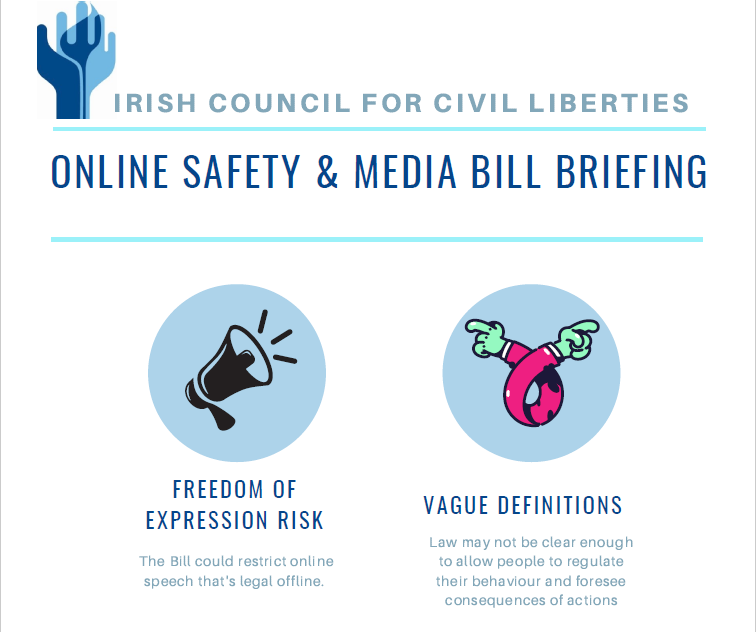11 March 2021
Significant parts of the proposed new legislation on online safety may not meet human rights standards, says the Irish Council for Civil Liberties (ICCL). The legislation proposes to restrict non-illegal speech online. However, the right to freedom of expression applies to online spaces, and there are grave dangers in seeking to restrict speech that may be distasteful but does not break any existing laws.
Executive Director of ICCL, Liam Herrick, said:
“A Media Commission like the one proposed in this legislation could play a useful role in the regulation of online illegal speech. It’s particularly helpful that additional routes of redress for victims of online crime would be available. But we are concerned about the impact to freedom of expression and other rights if non-illegal speech becomes restricted online.”
ICCL made a submission to the Oireachtas Committee which is looking at this issue, outlining our concerns about freedom of expression, the right to send and receive information, and the right to privacy.

These rights are all enshrined in, variously, the Irish Constitution and binding European and international human rights law. They are not absolute. But if they are to be impinged upon, the measures must pass the three-part test of legality, necessity and proportionality.
Significant parts of this legislation may not pass this test, particularly the measures to tackle cyberbullying which will regulate vaguely-defined “harmful online content”. It is not clear in the proposed legislation who could be subject to regulation and/or when.
We outline four additional areas of concern.
The first is that the vague definition of harmful content will make it difficult for people to know when their behaviour could be subject to sanction. Under the threat of sanction, vague legal definitions could lead to self-censorship.
Second, the position of an Online Safety Commissioner is mentioned in the Bill once in the 141-page general scheme of the Bill. But it fails to provide for the role of the Online Safety Commissioner and/or outline what this person’s role or function will be.
Third, internet users could be subject to new regulatory codes normally used for or enforced against licenced bodies. This fails to recognise the very different rights and responsibilities of individuals and powerful corporations.
And fourth, the Bill proposes to regulate private communication services in respect of content which it is a criminal offence to disseminate. ICCL is concerned that there is no explanation of how the Media Commission will identify illegal content within private communications in a legal, proportionate, and necessary manner.
Overall, the approach in the Bill is problematic. It presents as implementing an EU Directive but in fact goes far beyond that. It introduces vagueness and uncertainty to the law. It proposes to create a new regulator whose role is wholly unclear, and it may have unintended effects in restricting freedom of expression and private communications.
Other possible approaches should also be considered, including establishing a system that would allow social media platforms and other online service providers to opt-in to an online harms code, with specific attention given to children. This could see said platforms earn a level of accreditation for their child safety standards with a regulator assessing and monitoring this accordingly.
On the complex question of regulating harmful speech, ICCL suggests that it would be more prudent to wait for the enactment of Hate Crime and Incitement to Hatred legislation this year, as the Government is already committed to; before trying to define these concepts in this Bill.
ENDS/
Find a short briefing for press
ICCL has over 40 years of campaigning for free expression.
ICCL does not support criminalising speech, except in the most extreme circumstances such as incitement to genocide or hateful violence or propaganda for war. We endorse the hate speech pyramid developed by ARTICLE 19. This sets out a distinction between extreme hate speech which must be prohibited; hate speech which may be prohibited; and deeply offensive speech which is problematic but should not be prohibited.
The Irish Council for Civil Liberties (ICCL) is Ireland’s oldest independent human rights campaigning organisation. We monitor, educate and campaign to secure human rights for everyone in Ireland.
For comment: Liam Herrick and Olga Cronin
For media queries: sinead.nolan@iccl.ie

